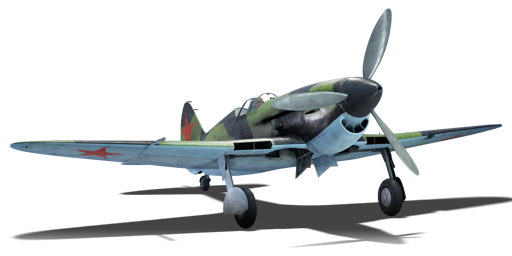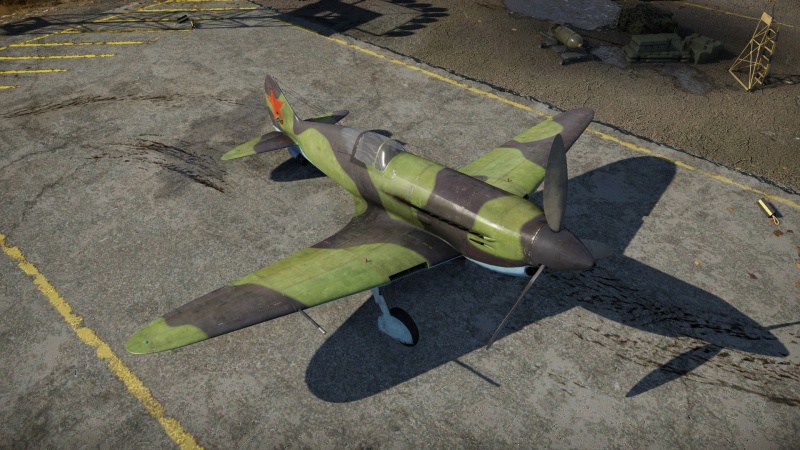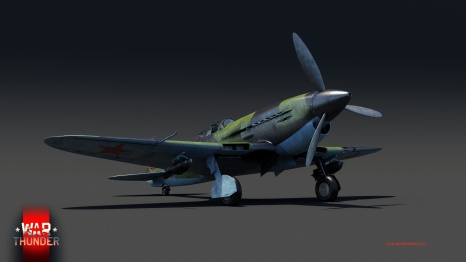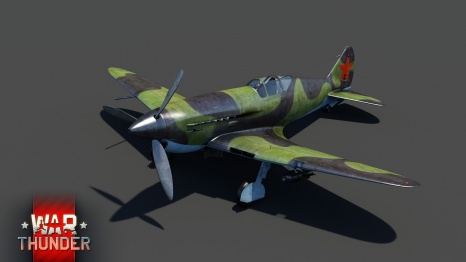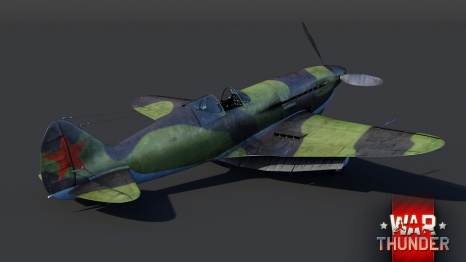ITP (M-1)
Contents
Description
The ITP (M-1) is a premium gift rank III Soviet fighter with a battle rating of 4.7 (AB), 4.0 (RB), and 3.3 (SB). It was introduced during Update "Hot Tracks" as a reward for Battle Pass: Season II, "Steel Centurion".
General info
Flight performance
Describe how the aircraft behaves in the air. Speed, manoeuvrability, acceleration and allowable loads - these are the most important characteristics of the vehicle.
| Characteristics | Max Speed (km/h at 6,100 m) |
Max altitude (metres) |
Turn time (seconds) |
Rate of climb (metres/second) |
Take-off run (metres) | |||
|---|---|---|---|---|---|---|---|---|
| AB | RB | AB | RB | AB | RB | |||
| Stock | ___ | ___ | 11750 | __._ | __._ | __._ | __._ | 395 |
| Upgraded | 695 | 676 | 20.2 | 21.0 | 17.8 | 15.1 | ||
Details
| Features | ||||
|---|---|---|---|---|
| Combat flaps | Take-off flaps | Landing flaps | Air brakes | Arrestor gear |
| ✓ | ✓ | ✓ | X | X |
| Limits | ||||||
|---|---|---|---|---|---|---|
| Wings (km/h) | Gear (km/h) | Flaps (km/h) | Max Static G | |||
| Combat | Take-off | Landing | + | - | ||
| 800 | 320 | ___ | ___ | ___ | ~__ | ~__ |
| Optimal velocities (km/h) | |||
|---|---|---|---|
| Ailerons | Rudder | Elevators | Radiator |
| < ___ | < ___ | < ___ | > ___ |
Survivability and armour
- 13 mm steel seat
- Self-sealing fuel tanks (1 under pilot, 1 under 37 mm cannon breech, 1 in each wing)
Modifications and economy
Armaments
Offensive armament
The ITP (M-1) is armed with:
- 1 x 37 mm SH-37 cannon, nose-mounted (50 rpg)
- 2 x 20 mm ShVAK cannons, nose-mounted (200 rpg = 400 total)
Suspended armament
The ITP (M-1) can be outfitted with the following ordnance:
- Without load
- 2 x 100 kg FAB-100sv bombs (200 kg total)
- 4 x 50 kg FAB-50sv bombs (200 kg total)
- 8 x RS-82 rockets
- 8 x RBS-82 rockets
Usage in battles
Describe the tactics of playing in the aircraft, the features of using aircraft in a team and advice on tactics. Refrain from creating a "guide" - do not impose a single point of view, but instead, give the reader food for thought. Examine the most dangerous enemies and give recommendations on fighting them. If necessary, note the specifics of the game in different modes (AB, RB, SB).
Manual Engine Control
| MEC elements | ||||||
|---|---|---|---|---|---|---|
| Mixer | Pitch | Radiator | Supercharger | Turbocharger | ||
| Oil | Water | Type | ||||
| Controllable | Controllable Not auto controlled |
Controllable Not auto controlled |
Controllable Not auto controlled |
Separate | Not controllable 1 gear |
Not controllable |
Pros and cons
Pros:
- Powerful armament, can destroy even the most armored air targets with just a small burst
- Quite maneuverable
- As a premium aircraft, has better SL and RP multipliers
- ShVAKS have a high rate of fire
- 37 mm cannon has a rather generous amount of ammo (50 rounds)
- 37 mm cannon can load armored targets belts, capable of penetrating up to 60 mm of armour
- In addition to the 37 mm cannon, can carry bombs and rockets, allowing to to be useful in ground battles
- Minimum fuel load is 31 minutes
- Great climb rate, can manage 30 degrees with WEP
- From a distance, can be mistaken for a MiG-3, allowing you to take the upper hand
Cons:
- Liquid cooling system is located in the wings, allowing it to easily be hit
- Only one 13 mm steel plate protecting the pilot, can easily be pilot sniped
- Forward acceleration isn't very good compared to other aircraft of a similar BR
- Engine overheats at 100% throttle
- 37 mm cannon is inaccurate, making it hard to use
- 37 mm cannon overheats after just 6 shots
History
Devblog
At the end of 1940, the aircraft designer Nikolai Polikarpov came up with the initiative to create a fundamentally new combat aircraft for Soviet aviation - a fighter with heavy cannon armament, that could fulfill tasks typical for heavy fighters and attack aircraft, while possessing the flight characteristics of a light single-engine monoplane fighter. The military accepted Polikarpov's idea with interest, formulating tasks for the future aircraft, such as effective air combat, including the destruction of bombers, aerial destruction of tanks and armored vehicles, as well as escort missions. The assembly of the first prototype began in May of 1941, however, due to the rapid offensive from the enemy towards Moscow, production had to be evacuated to Novosibirsk, Siberia, where the test unit was completed.
ITP (M-1) (ITP is for “heavy cannon fighter”) was a monoplane fighter with a 1,650 hp M-107P engine, the armament of the aircraft consisted of a 37mm Sh-37 motor-mounted gun and a pair of 20mm ShVAK cannons. Flight tests began in February 1942, but were not fully completed due to engine problems. A little later, versions with the M-107A and the AM-37 engines were tested, on the second prototype, the 37mm cannon was replaced with another ShVAK cannon. Work on the ITP project was interrupted due to the untimely death of the Soviet "king of fighters" in 1944.
Media
See also
Links to the articles on the War Thunder Wiki that you think will be useful for the reader, for example:
- reference to the series of the aircraft;
- links to approximate analogues of other nations and research trees.
External links
Paste links to sources and external resources, such as:
- topic on the official game forum;
- other literature.
| Polikarpov Design Bureau (Опытное конструкторское бюро Поликарпова) | |
|---|---|
| I-15 | I-15 WR · I-15 M-22 · I-15 M-25 · I-15bis · Krasnolutsky's I-15bis |
| I-153 | I-153 M-62 · Zhukovsky's I-153-M62 · I-153P |
| I-16 | I-16 type 5 · I-16 type 10 · I-16 type 18 · I-16 type 24 · I-16 type 27 · I-16 type 28 |
| I-180 | I-180S · I-185 (M-71) · I-185 (M-82) |
| ITP | ITP (M-1) |
| Twin-engine fighters | TIS MA |
| Bombers | Po-2 · Po-2M |
| Export | ␗I-15bis · ␗I-153 M-62 · ␗I-16 type 5 · ␗I-16 type 10 · ␗I-16 type 17 · ␗I-16 Chung 28 |
| USSR fighters | |
|---|---|
| I-15 | I-15 WR · I-15 M-22 · I-15 M-25 · I-15bis · Krasnolutsky's I-15bis |
| I-153 M-62 · Zhukovsky's I-153-M62 · I-153P | |
| I-16 | I-16 type 5 · I-16 type 10 · I-16 type 18 · I-16 type 24 · I-16 type 27 · I-16 type 28 · I-180S |
| I-29 | I-29 |
| I-185 | I-185 (M-71) · I-185 (M-82) |
| I-225 | I-225 |
| ITP | ITP (M-1) |
| MiG-3 | MiG-3-15 · MiG-3-15 (BK) · MiG-3-34 |
| LaGG | I-301 · LaGG-3-4 · LaGG-3-8 · LaGG-3-11 · LaGG-3-23 · LaGG-3-34 · LaGG-3-35 · LaGG-3-66 |
| La | La-5 · La-5F · La-5FN · La-7 · Dolgushin's La-7 · La-7B-20 · La-9 · La-11 |
| Yak-1/7 | Yak-1 · Yak-1B · Yak-7B |
| Yak-3 | Yak-3 · Eremin's Yak-3(e) · Yak-3P · Yak-3T · Yak-3U · Yak-3 (VK-107) |
| Yak-9 | Yak-9 · Yak-9B · Golovachev's Yak-9M · Yak-9T · Yak-9K · Yak-9U · Yak-9UT · Yak-9P |
| Other countries | ▂P-40E-1 · ▂P-47D-27 · ▂Hurricane Mk IIB · ▂Fw 190 D-9 · ▂Spitfire Mk IXc |
| P-39 | ▂P-39K-1 · ▂Pokryshkin's P-39N-0 · ▂P-39Q-15 |
| P-63 | ▂P-63A-5 · ▂P-63A-10 · ▂P-63C-5 |
| USSR premium aircraft | |
|---|---|
| Fighters | Krasnolutsky's I-15bis · I-16 type 28 · Zhukovsky's I-153-M62 · I-153P · I-180S · I-301 · ITP (M-1) |
| LaGG-3-4 · LaGG-3-23 · LaGG-3-34 · Dolgushin's La-7 · La-11 | |
| Eremin's Yak-3(e) · Yak-3 (VK-107) · Yak-3T · Golovachev's Yak-9M | |
| ▂P-39K-1 · ▂Pokryshkin's P-39N-0 · ▂P-39Q-15 · ▂P-40E-1 · ▂P-47D-27 · ▂P-63A-5 · ▂P-63A-10 · ▂P-63C-5 | |
| ▂Hurricane Mk IIB · ▂Spitfire Mk IXc · ▂Fw 190 D-9 | |
| Twin-engine fighters | I-29 |
| Jet fighters | Su-11 · MiG-15bis ISh · MiG-17AS · MiG-21S (R-13-300) · MiG-23ML |
| Strike aircraft | IL-2M "Avenger" · IL-2 M-82 · IL-8 (1944) · Su-6 · Tandem MAI · TIS MA · Su-8 · Tu-1 |
| Yak-38 · Su-7BMK · Su-25K · Su-39 | |
| Bombers | Po-2M · Be-6 · MBR-2-M-34 · Pe-2-205 · TB-3M-17-32 |
| ▂PBY-5A Catalina · ▂Hampden TB Mk I · ▂A-20G-30 · ▂B-25J-30 | |


